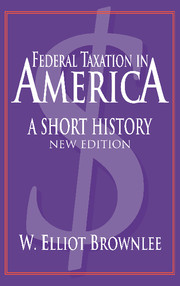Book contents
- Frontmatter
- Contents
- Acknowledgments
- Introduction: Taxation and national emergencies
- Part I The historic regimes
- 1 The formative tax regimes, 1789–1916
- 2 The democratic-statist tax regimes, 1916–1941
- 3 The era of easy finance, 1941–1980
- Part II The conservative challenge
- Historiography and bibliography
- Index
- WOODROW WILSON CENTER SERIES
2 - The democratic-statist tax regimes, 1916–1941
Published online by Cambridge University Press: 18 August 2009
- Frontmatter
- Contents
- Acknowledgments
- Introduction: Taxation and national emergencies
- Part I The historic regimes
- 1 The formative tax regimes, 1789–1916
- 2 The democratic-statist tax regimes, 1916–1941
- 3 The era of easy finance, 1941–1980
- Part II The conservative challenge
- Historiography and bibliography
- Index
- WOODROW WILSON CENTER SERIES
Summary
By the time of World War I, the forces of industrialization had abundantly fueled democratic pressures for the federal government to enter the arena of direct taxation and assume some of the responsibility that state and local governments had undertaken for ameliorating social tensions over the uneven distribution of wealth. At the same time, mature industrialization, which included the flowering of modern corporations and of sophisticated financial intermediaries, had created much of the organizational capability necessary for implementing a direct tax on the incomes of corporations and wealthy individuals. But even so, the federal government would have been slow to adopt income taxation without the play of historical contingency. Without the intervention of the United States in World War I and the management of that intervention by the leaders of the Democratic Party, the development of federal taxation would have proceeded far more incrementally. It almost certainly would have relied much more heavily on the taxation of consumption.
As it was, the highly contingent politics of mobilizing for World War I drove the creation of a democratic-statist tax regime. That regime, with its steeply progressive tax rates and its tax base consisting of the incomes of corporations and wealthy individuals, provided the core of wartime finance. The regime then endured and survived the return to “normalcy” after World War I. The democratic-statist thrust of federal taxation weakened under the economic and political pressures that the highly progressive rate structure created for carving out loopholes.
- Type
- Chapter
- Information
- Federal Taxation in AmericaA Short History, pp. 58 - 106Publisher: Cambridge University PressPrint publication year: 2004

